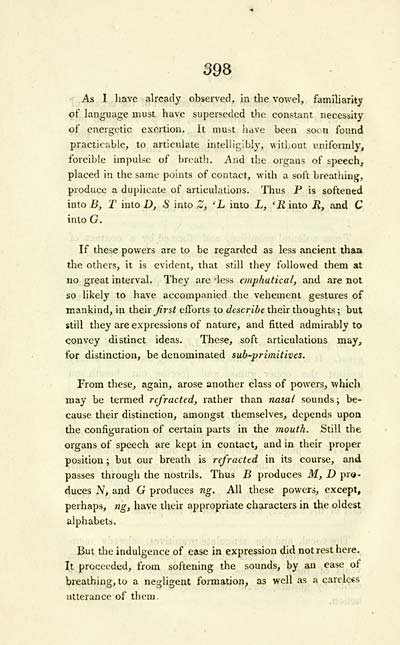Blair Collection > Celtic researches, on the origin, traditions & language, of the ancient Britons
(492)
Download files
Complete book:
Individual page:
Thumbnail gallery: Grid view | List view

398
As I have already observed, in the vowel, familiarity
of language must have superseded the constant necessity
of energetic exertion, it mu^t have been socn found
practicable, to articulate intelligibly, without uniformly,
forcible impulse of breath. And the organs of speech,
placed in the same points of contact, with a soft breathing,
produce a duplicate of articulations. Thus Ρ is softened
into B, Τ into D, S into Z, 'L into L, 'li into R, and C
into G.
If these powers are to be regarded as less ancient thaa
the others, it is evident, that still they followed them at
no great interval. They are 'less emphatical, and are not
so likely to have accompanied the vehement gestures of
mankind, in their ^rsí efforts to describe their thoughts ; but
still they are expressions of nature, and fitted admirably to
convey distinct ideas. These, soft articulations may,
for distinction, be denominated sub-primitives.
From these, again, arose another class of powers, which
may be termed refracted, rather than nasal sounds ; be-
cause their distinction, amongst themselves, depends upon
the configuration of certain parts in the mouth. Still the
organs of speech are kept in contact, and in their proper
position ; but our breath is refracted in its course, and
passes through the nostrils. Thus Β produces M, D pro-
duces N, and G produces ng. All these powers, except,
perhaps, ng, have their appropriate characters in the oldest
alphabets.
But the indulgence of ease in expression did not rest here.
It proceeded, from softening the sounds, by an ease of
breathing, to a negligent formation^ as well as a carclc«s
utterance of them
As I have already observed, in the vowel, familiarity
of language must have superseded the constant necessity
of energetic exertion, it mu^t have been socn found
practicable, to articulate intelligibly, without uniformly,
forcible impulse of breath. And the organs of speech,
placed in the same points of contact, with a soft breathing,
produce a duplicate of articulations. Thus Ρ is softened
into B, Τ into D, S into Z, 'L into L, 'li into R, and C
into G.
If these powers are to be regarded as less ancient thaa
the others, it is evident, that still they followed them at
no great interval. They are 'less emphatical, and are not
so likely to have accompanied the vehement gestures of
mankind, in their ^rsí efforts to describe their thoughts ; but
still they are expressions of nature, and fitted admirably to
convey distinct ideas. These, soft articulations may,
for distinction, be denominated sub-primitives.
From these, again, arose another class of powers, which
may be termed refracted, rather than nasal sounds ; be-
cause their distinction, amongst themselves, depends upon
the configuration of certain parts in the mouth. Still the
organs of speech are kept in contact, and in their proper
position ; but our breath is refracted in its course, and
passes through the nostrils. Thus Β produces M, D pro-
duces N, and G produces ng. All these powers, except,
perhaps, ng, have their appropriate characters in the oldest
alphabets.
But the indulgence of ease in expression did not rest here.
It proceeded, from softening the sounds, by an ease of
breathing, to a negligent formation^ as well as a carclc«s
utterance of them
Set display mode to: Large image | Transcription
Images and transcriptions on this page, including medium image downloads, may be used under the Creative Commons Attribution 4.0 International Licence unless otherwise stated. ![]()
| Early Gaelic Book Collections > Blair Collection > Celtic researches, on the origin, traditions & language, of the ancient Britons > (492) |
|---|
| Permanent URL | https://digital.nls.uk/75769307 |
|---|
| Description | A selection of books from a collection of more than 500 titles, mostly on religious and literary topics. Also includes some material dealing with other Celtic languages and societies. Collection created towards the end of the 19th century by Lady Evelyn Stewart Murray. |
|---|
| Description | Selected items from five 'Special and Named Printed Collections'. Includes books in Gaelic and other Celtic languages, works about the Gaels, their languages, literature, culture and history. |
|---|

